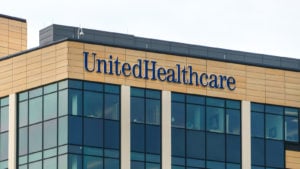Shares in United Healthcare (NYSE:UNH) were the “disaster du jour” on Sept. 21, following the death of Supreme Court Justice Ruth Bader Ginsburg. At one point, UNH stock was down $17.

The stock’s fall assumed Ginsberg’s death will let the Trump administration have the Affordable Care Act, known as Obamacare, declared unconstitutional.
UNH stock recovered somewhat but the health insurer still lost $10 billion of market cap. It opened for trade Sept. 22 at $298, a market cap of $284 billion. The company’s price-earnings ratio is just under 17, and its $1.25/share dividend yields 1.67%.
Adapting to Managed Care
Ironically, the stock is being dinged because of a law it fought. UNH has extensive ties to conservative organizations and encouraged employees to lobby against the bill.
Since then, however, UNH has adapted. It used stimulus money to automate operations. It gained control over drug prices after buying the Catamaran pharmacy benefit manager. The company has even bought enough clinics to offer a managed care plan in California.
UNH stock is up 30% over the last year. It brought 10.7% of revenue to the bottom line in the most recent quarter.
Contrary to being dependent upon Obamacare, United Healthcare left most Healthcare.gov exchanges last year. Its cash flow is driven by control of the AARP’s Medicare Part D business, and self-insurance by large employers.
The move to dump United Healthcare shares based on the pending fall of Obamacare makes no sense. An end to the law would reduce competition from competitors like Centene (NYSE:CNC) and CVS (NYSE:CVS). Both have transformed themselves to meet the law.
UNH Stock Full Value
Even before Ginsburg’s death, some analysts were urging clients to take profits in United Healthcare.
One reason is the COVID-19 pandemic. The pandemic has created huge costs for the health care system that will be difficult to recoup.
Then there’s United Healthcare’s dominance in the sector. Over the last five years UNH has been the best-performing health insurance stock by far. This is because it is the biggest health insurer by far. It had $249 billion in revenue in 2019, against $104 billion for Humana (NYSE:HUM). CVS and Cigna (NYSE:CI) achieved similar scale to UNH only through mergers. Aetna was acquired by CVS in 2018 and Cigna bought Express Scripts in 2019.
The Managed Care Story
What Obamacare did, besides create the government-run exchange, was to push efficiency and the managed care model.
Managed care controls costs through ownership of clinics, putting doctors on salary and taking control of drug supply chains. A successful legal effort against the Obamacare law won’t change the new economic realities.
While many Democrats have been agitating for a government-run “Medicare for all” program, Joe Biden doesn’t want the health insurers broken up. It’s difficult to foresee how such a break-up could even occur without doing enormous damage to the healthcare system. We’re talking about nearly 18% of the U.S. gross domestic product. Even Medicare itself is mostly run under private contracts to companies like Centene.
The Bottom Line
Obamacare’s signing on March 10, 2010, was a great opportunity to get into United Healthcare. On that date the shares were trading at about $32 each and paid no dividend. Their performance during the debate over the law trailed that of the S&P 500 by 2 to 1.
Since then, United Healthcare is up 815%, more than four times the gain in the S&P average.
Investors shouldn’t be worried if it’s thrown back into the political brier patch. It will adapt.
On the date of publication, Dana Blankenhorn did not have (either directly or indirectly) any positions in any of the securities mentioned in this article.
Dana Blankenhorn has been a financial and technology journalist since 1978. He is the author of the environmental thriller Bridget O’Flynn and the Bear, available at the Amazon Kindle store. Write him at danablankenhorn@gmail.com or follow him on Twitter at @danablankenhorn.
